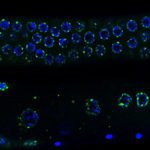Link to Pubmed [PMID] – 27709564
Link to DOI – 10.1007/s12602-016-9232-z
Probiotics Antimicrob Proteins 2017 06; 9(2): 142-149
Travellers’ diarrhoea caused by enteric protozoa like Entamoeba histolytica is among the most common protozoan diseases in developing countries. In developing countries, amoebiasis is the second most prevalent protozoan disease. This protozoan parasite is often known to coexist as a part of the normal gut microbiota. It is estimated that around 50-60 % of population in developing countries might be harbouring Entamoeba in an asymptomatic manner. Due to physiological perturbation or upon immuno-compromise, it can become virulent and then cause diarrhoea, bloody stools and may invade other organs if left untreated. Nitroimidazole drugs, namely metronidazole and tinidazole, are widely used to treat protozoan infections. These drugs often show dose-dependent side effects. With emerging antibiotic resistance, novel therapeutics to prevent parasitic infections is required. This study aims to study effect of probiotics on prevention of Amoebiasis. In this study, we have investigated the effect of selected probiotics on the growth of Entamoeba. From the list of probiotics being currently used, five bacterial strains were selected for testing. These probiotic strains were co-cultured with Entamoeba, and their effect on Entamoeba proliferation was checked. Of the five probiotics chosen, individual treatments of Lactobacillus casei and Enterococcus faecium showed a significant reduction of up to 71 % in parasite survival only at higher CFUs. When the two probiotics were used in combination, the percentage of survival reduced gradually further to 80 % at a total CFU of 109 cells/ml of bacteria. The study lays the foundation for providing cost-effective prophylactic treatment for amoebiasis without the overuse of antibiotics.

